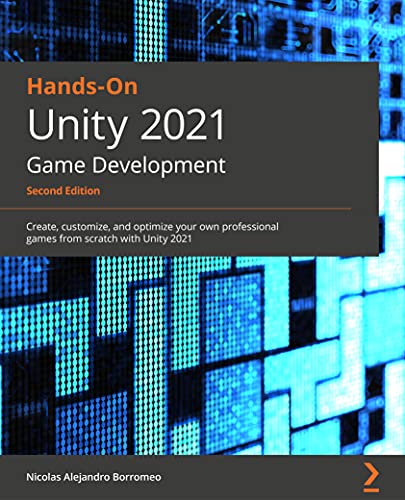Nicolas Alejandro Borromeo is the author of Hands-On Unity 2021 Game Development, we got the chance to sit down with him and find out more about his experience of writing with Packt.
Q: What is/are your specialist tech area(s)?
Nicolas: Unity Developer.
Q: How did you become an author for Packt? Tell us about your journey. What was your motivation for writing this book?
Nicolas: I was contacted via LinkedIn by the Packt team and offered me to create a book. I always wanted to sit down and start a book but always had excuses to not do it, so this was the great trigger I was needing. We decided to write something in my expertise area, Unity, so we outlined a brand new book about all the brand new features in the latest versions of Unity.
Q: What kind of research did you do, and how long did you spend researching before beginning the book?
Nicolas: Luckily I was always a Unity enthusiast and investigated the new features as soon as they were released, so it was a matter of downloading Unity, read the release notes, and start playing around with all the new toys!. I combined years of experience introducing Unity to newcomers, with the investigations we do about how to exploit the new features the most we can to outline the best path to aboard Unity.
Q: Did you face any challenges during the writing process? How did you overcome them?
Nicolas: The most challenging part was keeping up with Unity, as I wrote a chapter, a new version of Unity was released, making some of the steps and screenshots outdated. Our approach was to stick with one Unity version until all chapters were created, and then do a full book review with the latest version.
Q: What’s your take on the technologies discussed in the book? Where do you see these technologies heading in the future?
Nicolas: Unity is constantly evolving, improving current features and introducing new ones that will potentially replace current ones. Some of the Unity systems discussed in the book have several years in the engine, but Unity keeps improving them. Others are brand new and still paving their way to became Unity standard. Its difficult to say which one will stay and which one will be deprecated, and that’s why we need books like this, to keep up as much as we can.
Q: Why should readers choose this book over others already on the market? How would you differentiate your book from its competition?
Nicolas: The main difference is the approach of the book. We introduce core concepts needed to anyone starting to use the engine, as well as highlighting the new features of them, making it suitable for both beginners and veteran Unity developers. Also, all of this is applied to a single project, ending the book with a fully working game. Finally, the book is structured in a way that non-programmers can still enjoy most of the book, and then deep dive into the programming chapters with the help of any C# book (Packt has some amazing books on this topic!).
Q. What are the key takeaways you want readers to come away from the book with?
Nicolas: I want them to not only dominate core aspects of Unity, but to be in the bleeding edge of the Unity systems. Being aware of Unity’s constant evolution, year to year we intend to release updated versions of the book for them to stay in that place.
Q. What advice would you give to readers learning tech? Do you have any top tips?
Nicolas: Do, do, do. A well-known motto in the industry is “Fail fast, fail often”, is the only way to learn. You need to study, but you also need to do, and finish what you do (I know, it is more difficult than it sounds). Always try to apply every concept you learn into a project, and mix them with other concepts, to see how they feedback each other.
Q. Can you share any blogs, websites and forums to help readers gain a holistic view of the tech they are learning?
Nicolas: The Unity official resources are good enough for this:
https://unity.com/es/community
https://learn.unity.com
https://blog.unity.com/es
https://forum.unity.com
Q. How would you describe your author journey with Packt? Would you recommend Packt to aspiring authors?
Nicolas: The first book is always the difficult one. Learning all the procedures and good practices of creating a book can be challenging, the first chapters will take probably weeks each. But after writing a couple of them, you will get the hang of it and the speed will increase. My recommendation is to try it, hold on there, consider you will be writing the book maybe for a full year, and there will be up and downs, and constant iteration. But after doing it, and see it get published, you will get a big rewarding feeling that will motivate you to keep doing it.
Q. Do you belong to any tech community groups?
Nicolas: I follow some game dev channels in Reddit, I don’t have any specific one to recommend.
Q. What are your favorite tech journals? How do you keep yourself up to date on tech?
Nicolas: Usually follow the Unity Blog and try to keep up with the GDC latest videos, a great source of info.
Q. How did you organize, plan, and prioritize your work and write the book?
Nicolas: It’s not easy to write a book while also having a full-time job, you need to be methodic. The best recommendation I could give you is to have a routine, a specific day/days of the week at a specific time allocated just for this.
You not only need to be wary of how many pages each chapter will have to estimate how much time will it take, but also to be honest with yourself regarding how much you know on certain areas, some will require investigation and trying, and that could take as much as writing the chapter itself.
I usually create first the code/assets I need for the chapter, and once I finish, I delete them and start writing the chapter, redoing the steps one by one.
Also, while we need to write a chapters plan, don’t be shy to change it on the go if you think that will improve the book, try to be flexible with early plannings.
Q. What is the one writing tip that you found most crucial and would like to share with aspiring authors?
Nicolas: Try to read the chapter as if you were a reader with no knowledge whatsoever on the topic. It is pretty difficult if you never taught someone before because you will not know the usual pitfalls and handles the students will deal with. You can always get a confidant to read what you write and give constructive feedback to see if they can understand you.
You can find Nicolas’s book on Amazon by following this link: Please click here









